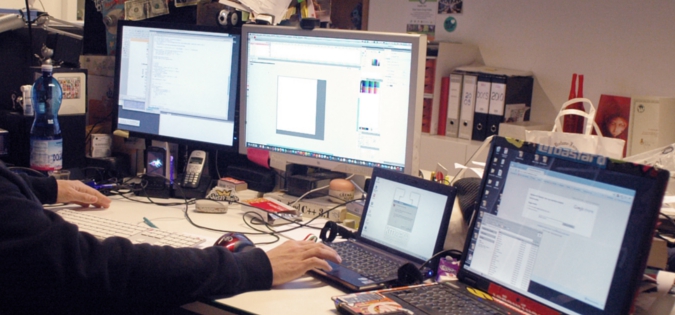Looking for a job in Prague?
Click here to find thousands of positions for English and multi-lingual speakers.
As world economies shake, rattle and roll, subject to often-mysterious whims and butterfly effects of interconnected global markets, it’s tougher than ever for an average person to figure out how to make a living. Workplace demands change at an increasingly fast pace and a skill necessary today may not be needed tomorrow. In fact, what’s becoming very important is having the right attitude and an aptitude to learn new skills. For the sake of job seekers in the Czech Republic, we investigated major trends of the labor markets to figure out what will be the hot jobs of the future.
We spoke with Erik Heidefors, senior business manager for Reed, a powerhouse global recruitment firm. He sees IT (Information Technologies) and Engineering as fields that are “hugely growing” in demand, especially as there is a big shortage of candidates in both. On the other hand, he sees Marketing and HR fields offering a surplus of candidates, as traditional marketing (ATL, BTL, PR) is becoming less important and back office support in HR is contracting. The bright side for employees would include the areas of online marketing, eCommerce sales and “Relationship Management” marketing activities. The HR folks who are more business-savvy and can understand the business as a whole (advising top management) are also staying vital. In fact, Mr. Heidefors pointed out that having a business education is more and more important in a variety of fields, saying that “increasingly, companies are not satisfied with a specialist that can only do their specific job description, but rather look for partners who can consult on a business level”.
Alena Foustkova, a lecturer in the Business Programme of Prague College sees an even larger trend here, saying that “the needs of the employers will be more and more focused on candidates who would possess skills of independent thinking and ideas which would allow a company to be competitive not just by providing a high level of expertise, but also by being innovative and investing in their long term planning into the innovative ideas.”
She further elaborates that what the companies are looking for are idea-generators, especially in light of competition from emerged markets like China and India. “If Europe wants to keep up with the speed of implementing ideas into practice on the worldwide scale, in my opinion, an investment into a creative leadership will be a must.”
What does this mean practically, in these days of the 8.1% unemployment rate in the CR? There are much fewer entry-level jobs, with companies being overwhelmed when they post entry-level positions. People without necessary working experience, people under 30 and people over 50 are also finding it hard to find work. Mr. Heidefors sees the construction, development and real estate industries as under pressure, with their markets contracting. The Fast Moving Consumer Goods or FMCG markets (food, alcohol, etc.) and, especially the luxury markets are holding steady if not expanding, while marketing/HR/office support fields are hit the hardest with way too many candidates and not enough jobs. From the educational standpoint, people with degrees in social sciences will find it harder and harder to get work. This is due not just to economic downturns, but because of changing technologies. Companies are relying more and more on IT systems for business needs. You need to have a good grasp of IT to stay relevant (and employed) even if your job is not directly an IT job (finance, sales, logistics, etc.). There is a significant global shortage of developers, as many technologies need to be designed, tested and produced.

This reliance on computers is the same in the recruitment industry. Recruiters used to rely on newspaper advertisements and CVs sent via traditional mail, but now much of recruitment is done through LinkedIn, Facebook, Twitter, Google searches and the like. Mr. Heidefors concludes that “increasingly these days, your grasp of social media, searches, and using online methods for attracting candidates is more important than your personal network and industry experience.”
If you needed any more convincing that the computer is you best 21st century friend, last year’s list of best employers in the Czech Republic confirms it. Most of the top companies (from small to large size) are in the IT/Software sector. The list measures the satisfaction of the employees with their employers. The top small to medium size company was Amgen, a pharma R&D firm. Oriflame, Aquasoft, Et Netera, Avast, Red Hat and Microsoft are some of software firms that people love working for.
So what to do if you aren’t good at math and can’t go the IT route? Obviously, those hours you are spending on Facebook no longer look like a waste and are, in fact, valuable training. Mr. Heidefors also suggests specializing in a particular area like sales, online marketing or CRM. Alena Foustkova explains that these days “customers need to be reached at new places and with a message which will be relevant to them. So, the traditional media like print and television advertising have been used less due to the high costs of media, and so-called ‘relationship marketing’ takes over. That includes one-on-one communication, allowing a closer understanding of the customer needs.”
Another factor to consider is which companies hire the most people. From that standpoint, Škoda and the Czech Railways are among the largest employers in the CR.
If you’re interested in seeing some more prognostications, there is a Czech agency whose job it is to look at labor market trends. The National Observatory of Employment and Training’s page features some interesting analysis and forecasts for specific occupations. In a fitting example, it has a very low opinion on future job prospects of historians, citing an overabundance of graduates. History doesn’t seem to be keeping up with technology.












 Reading time: 4 minutes
Reading time: 4 minutes 


















